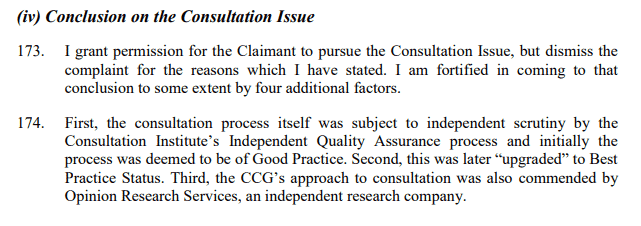News & Insights
Institute’s Quality Assurance of Dorset hospitals’ consultation vindicated…but challenges remain!
A preliminary analysis of R (ex parte Hinsull) v NHS Dorset CCG
Campaigners who challenged the NHS plan to centralise and specialise the adjacent hospitals in Bournemouth and Poole lost their case this week. Sir Stephen Silber, sitting as a High Court Judge dismissed all the grounds for complaint and, in respect of the disputed consultation, declared himself ‘fortified’ by knowing that the Consultation Institute had undertaken a full Quality Assurance and had declared it to be best practice.
We are obviously delighted to have helped produce a consultation that could withstand legal scrutiny in this instance, but issues still remain when the NHS seeks to make unpopular changes to long-established patterns of care. Although, in this particular case, the CCG was found to have acted lawfully in every significant respect, even a cursory look at the judgment would suggest that the arguments are sometimes finely balanced, and it must be almost impossible for public service Managers to be sure how vulnerable they might be if opponents can muster the money to go to Court.
In Dorset, changes to the hospitals were part of a much wider re-think as to how best to organise health and social care in the future. Work began long before Sustainability and Transformation Plans (STPs) were invented and the defending CCG could point to an impressive amount of pre-consultation stakeholder engagement during which a large number of ideas were whittled down to a binary choice to designate Bournemouth or Poole Hospitals as the major emergency care facility in the area. The claim inadequacy of the consultation was only one of a number of grounds upon which the claimants based their case, but a range of other questions came close to affecting the integrity of that consultation.
- Workforce issues
The future clinical strategy, as in other places, rests in part on accepting the analysis of the 2014 review by Sir Bruce Keogh into emergency and urgent care. He concluded that many who attended A & E departments would do better by receiving care in the community. In Dorset this would mean reducing aggregate attendances at the hospital but, as critics pointed out, this means adequately resourcing adult social care and children’s services. The Councils were already struggling with skills shortages and large budget cuts so claimants argued that the NHS proposals were not based on a sufficiently realistic assessment of the required workforce. The Judge disagreed, for there was evidence that this was much in the CCGs mind.
- The Bed Closure test
In April 2017, NHS England announced a new test for reconfigurations, which provided, inter alia for a requirement to demonstrate that there would be sufficient alternative provision that would be put in place alongside or ahead of bed closures. The CCG argued (and NHS England advised) that the test did not apply as its proposals had already been approved and authorised for consultation. The Judge rejected this; the test did apply. But he ruled that it had been satisfied because NHS England was the sole arbiter of compliance – a conclusion that could well be challenged in future cases. After all, the wording of the test is not that it should be approved by NHS England but that the CCG could demonstrate sufficient alternative provision. Claimants clearly felt that they could not do this – but the Judge disagreed.
- Travel Times
As often happens in cases of this kind, local communities fear that additional travel times will compromise clinical outcomes but legal challenges only succeed if it can be shown that consultations did not adequately explain the advantages and disadvantages of centralisation. In this case, the dispute centred around analysis carried out by expert consultants, and by a supplementary sampling exercise conducted by the ambulance service. Two recent cases concerning legal aid have led to successful claims by opponents who questioned some of the technical methodologies underlying aspects of proposals. Here claimants could not convince the Court that there was anything defective in this aspect of the CCGs case – but it remains a complex area with different views of best practice
- Referral to the Secretary of State
The Judge has clearly been much influenced by the fact that the Joint Health Overview and Scrutiny Committee (JHOSC) had not exercised its right to refer the proposal to the Secretary of State. He used this as evidence that local authorities did not have undue anxiety about issues such as workforce planning, bed closures or travel times. Our understanding is that campaigners are still hoping that such a referral could be made, and we are less sure that it is wise for a Judge to over-interpret a policy to defer a reference until the outcome of the judicial review is known.
These issues illustrate many of the questions that CCGs face when bringing controversial proposals to consultation. The NHS in Dorset has probably succeeded because it could point to extensive public engagement over an extended period of time, and had sought good professional advice at several points. The Institute is grateful to Jonathan Bradley who acted as Adviser and Mike Bartram who acted as Assessor under the Institute’s established six-intervention Quality Assurance model. We believe their advice was sound and pleased that the Court has confirmed it.




